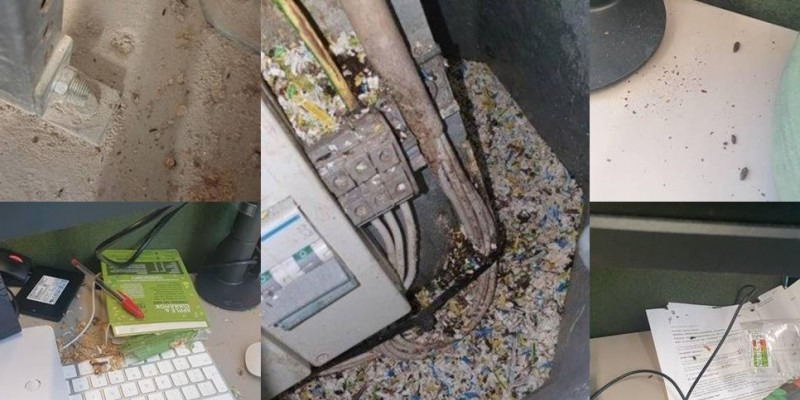
For many of us, working from home has become the norm. The risk of catching COVID-19 and the difficulties of enforcing social distancing between staff members means many businesses are not planning to repopulate their offices until late Spring 2021, at the earliest. This creates a problem as, while the humans are away, the mice will play.
The problem is not actually restricted to mice. A variety of pests are treating our empty offices as playgrounds. The problem is especially prevalent in cities, where the traditional sources of scavenged food (discarded restaurant and take-away food, full waste bins, etc.) have become scarce. Added to this, as the weather got colder, these invaders are looking for shelter and, since the disruptive presence of humans has all but disappeared, there is nothing to dissuade them from making our workplaces their homes.
What attracts pests into our offices?
Apart from safe and quiet harbourage, there is the attraction of maybe finding sources of food. We’ve helped an office with a rodent problem where it was clear that at the start of the first lockdown, in March 2020, people thought it wouldn’t be too long until they could return and so they left various snack foods in their desks.
Many pests are also looking for nesting materials and our offices are full of them. They can gnaw their way into most areas of a building if the proper preventative steps are not taken. All rodents (mice, rats, squirrels, etc.) have continuously growing incisors and so they must constantly gnaw to keep them at the optimal length. That is where the name comes from – rodere is the Latin for ‘to gnaw’. In an office environment there are many things to gnaw, including structural joists, wiring, etc., and when these are damaged the impact can be catastrophic.
The NEED to CUT COSTS
I understand the argument, after all we run several offices across the south of England. It may seem like a no-brainer to cut maintenance contracts for things like preventative pest control when your office is empty. The problem with that analysis is that it only considers one set of outgoings and it does not truly take into account the value that pest control brings to your business.
An obvious place to start is that preventative pest control will help to keep your premises free from pests and therefore the damage they can do to your buildings. The cost of a fire caused by a squirrel or mouse gnawing electric cables will be considerable in terms of rebuilding costs, lost business, disruption, etc. It should also be remembered that insurance may not always pay out if there is evidence of negligence, such as not having pest control in place.
At the same time pests like rats breed prolifically and quickly and so while they may start in your waste area, the infestation will quickly spread throughout the building and in to neighbouring properties. This will inevitably impact your reputation, which could also have financial repercussions.
Finally, there are the legal ramifications. If your business deals with food or has a cafeteria, then you may be prevented from reopening under the Food Safety Act 1990. When ‘due diligence’ in relation to preventing food contamination is not observed, the authorities can enforce closure notices, and not have preventative pest control in place can be counted as not observing ‘due diligence’.
Prevention is not just a case of putting down poison. There is a mind-boggling number of legislative requirements to which your business must conform in relation to pests:
- Animal Welfare Act 2006 – pest control must be carried out in a legally approved manner to minimise distress when capturing pest animals
- Control of Substances Hazardous to Health Regulations (Health and Safety at Work Act 1974) – chemical use must be controlled and the appropriate paperwork (COSHH and Safety data Sheets) provided for any product used on your site. Indiscriminate use of pesticides can have a catastrophic impact on the local environment and can potentially endanger pets and unaware stakeholders
- Public Health Acts 1936 and 1961 – it is a statutory obligation to protect employees and other stakeholders from vermin, including rodents, insects and pest birds
- Wildlife and Countryside Act – some animals are protected. If you allow non-professional pest control on your site this could endanger protected species (for example, bees and bats)
The financial and reputational impact of failing to observe these and other pieces of legislation can be enormous. The advantage of using a professional pest control company is that they will know and understand all these rules and can help you to protect your business.
Prevention is always better than cure. I know times are tough, but you really must ask yourself if your business can survive the fallout from failing to protect your business from pests.
About Cleankill
Cleankill Pest Control is an award-winning pest control business with offices across the south of England and a team covering Bristol. We specialise in helping businesses protect themselves from public health pests such as mice, rats, cockroaches and pest birds. We pride ourselves on offering fast and efficient service delivery and are recognised as a market leader for ‘green’ and innovative pest control methods. We are also licensed waste removers.
From our Bristol office, formerly Good Riddance Pest Control, we cover most of Gloucester, Bristol, Bath and Somerset.
Go to www.cleankill.co.uk for more information and email info@cleankill.co.uk for a free pest control survey or cost comparison.
- Log in to post comments
